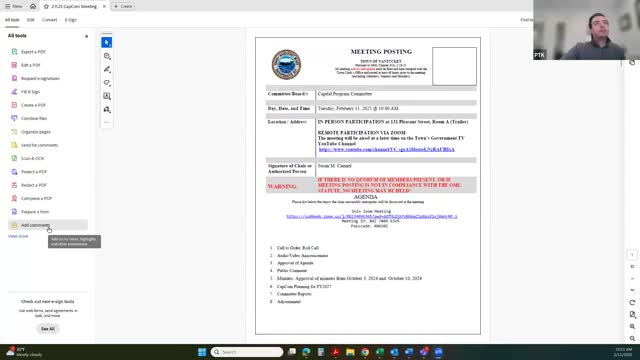Capital committee to revisit 'Rory' capital-request criteria; finance staff clarifies rules on unused borrowing
Get AI-powered insights, summaries, and transcripts
Subscribe
Summary
The town—s Capital Committee (CAPCOM) opened a planning discussion Tuesday morning and agreed to revisit the criteria and coding used in the Rory capital-request system so members can be confident projects are scored and tracked consistently.
The town—s Capital Committee (CAPCOM) opened a planning discussion Tuesday morning and agreed to revisit the criteria and coding used in the Rory capital-request system so members can be confident projects are scored and tracked consistently.
The committee—s discussion focused on three gaps members said made rankings hard to apply: unclear definitions for some criteria, the math used to combine criterion scores, and the inability to tell at a glance whether a request is a repeat or a current-year request. Committee members asked staff for changes to the Rory interface, clearer documentation and at least one in-person workshop before the next scoring season.
"I really think we you know, this doesn't have to be a 1 and done thing, but I do think it would be worthwhile to have a process where we really document fully what the pros each of the individual processes are and what the definition of all of these, different, names that we're we're we're bandying about today," said John Kitchener, a committee member, summarizing why more documentation is needed.
Members proposed several specific changes: add a checkbox or field to mark repeat or ongoing requests and the last year the request appeared; add a criterion name or checkbox to record whether the department has the manpower and contracts necessary to spend the money in the coming year; color-code or otherwise mark requests that are complete; and stress-test the mathematical formulas that combine individual scores and percentage allocations.
Committee members also agreed to a small, focused schedule for making changes instead of large sweeping edits. The group asked committee staff to collect suggested edits by email, draft an agenda around defined sections of the scoring tool, and meet again to work through one or two sections per session. Members set a follow-up meeting for 1 p.m. Tuesday the 18th to begin that work and asked staff to send a short list of proposed tweaks in advance.
Finance staff provided a procedural clarification during the discussion about what happens when projects come in under budget or when borrowing authorizations are not fully used. Brian (finance staff) explained the town—s process for borrowed funds and debt exclusions: "So in the case of a borrowing authorization, if the project comes in under the amount that was authorized, we would rescind a town meeting the difference between what the total project cost was and what the authorization was." He added that debt-exclusion proceeds are more limited: if a project was authorized with a debt exclusion, the unspent amount generally must be rescinded or used only for work within the scope of that debt-excluded project and cannot be transferred to unrelated departments or projects without a separate town-meeting action.
Committee members said the explanation helped clarify why some continuing requests (for example, routine cobblestone maintenance or fire-hydrant work) appear every year but should be coded differently than one-time large projects. Members asked staff to include fields in the request form to show remaining funds from prior authorizations and whether a request is for a true new appropriation or simply additional borrowing authority.
Votes at the meeting were procedural. The committee approved the meeting agenda by voice vote and later moved to approve minutes from a prior meeting. The minutes motion was approved with at least three recorded yes votes and one recorded abstention; committee staff will post the formal tally in the official minutes.
The committee plans to meet in person for the Rory revisions and to forward suggestions to staff for Plum (the Rory vendor) as soon as the committee signs off; members were warned that implementing software changes can take weeks to months and were urged to finalize edits early so Plum has time to make updates before the next scoring season.
The committee scheduled the next step: members will submit suggested changes to staff member Sue, who will circulate a short agenda and the items raised in this meeting. The committee will review the proposed edits at the follow-up session, refine language and the scoring math, then pilot the changes before the next round of capital scoring.
